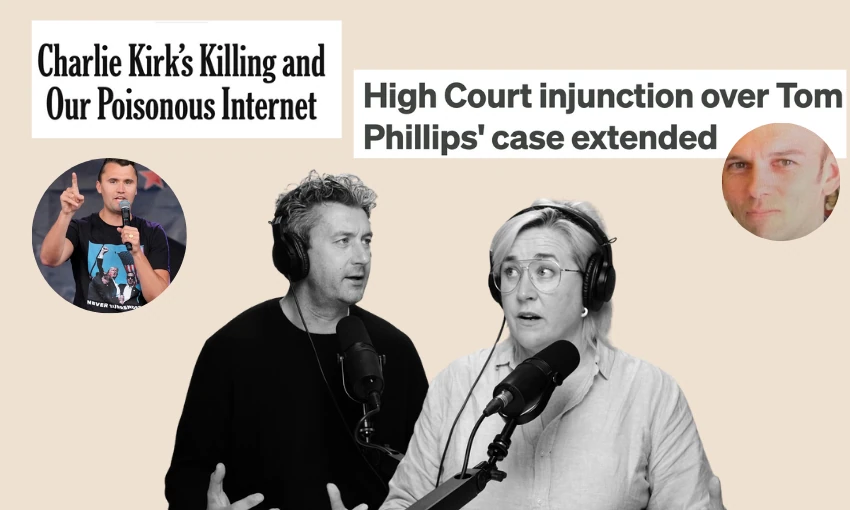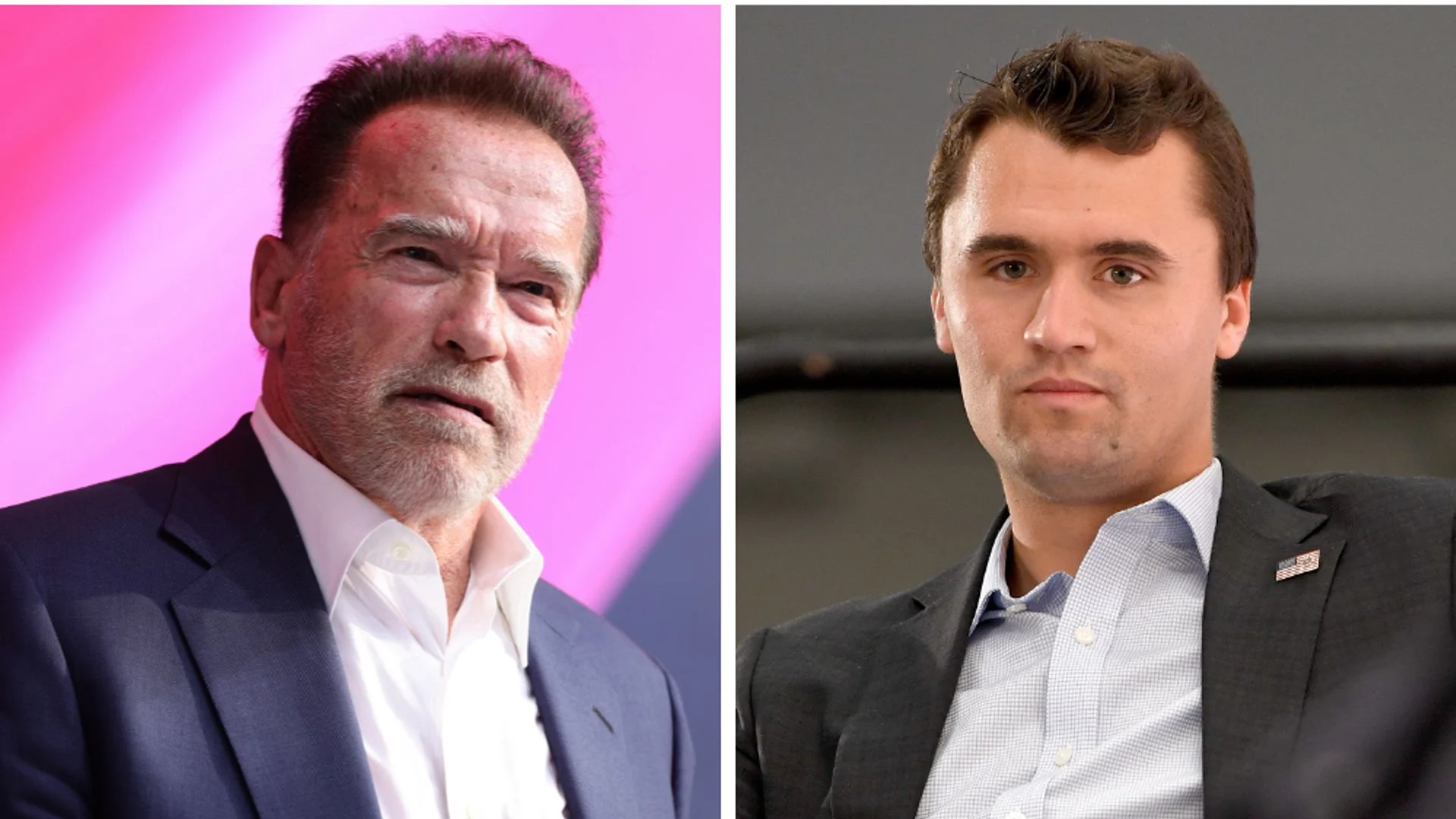The Fold: Charlie Kirk, Tom Phillips and how the chaos of digital worlds is impacting the one we physically live in
By The Spinoff
Copyright thespinoff

Duncan Greive and Anna Rawhiti-Connell discuss the breakdown of the walls between the real and online worlds in edited highlights from this week’s episode of The Fold.
The assassination of the right-wing activist Charlie Kirk, and the swirl of rumours surrounding Tom Philips, the Marokopa fugitive who died last week after three years on the run with his children, have dominated headlines over the last week.
Kirk was one of the most influential people in TrumpWorld, credited by many (including himself) with turning swathes of American young people conservative. His schtick was showing up on American campuses and debating anyone who showed up on any issue they cared to raise. He became a Rorschach test for modern politics – either an inspired and inspiring counter to a suffocating campus intellectual monoculture, or a cynical provocateur intent on undoing decades of progress across gender, race, sexuality and more.
Tom Philips died in the early hours of last Monday morning. His case had already become an online obsession before the circumstances of his death ensured a hurricane of national and global interest. That was the reality as of Tuesday morning, when news broke of an injunction, sought by a lawyer acting on behalf of the Philips family, preventing publication of “certain details of the case”.
That injunction has been extended and remains live, so we don’t discuss “certain details”. But as Heather du Plessis-Allan wrote in the Herald on Sunday, the widespread rumours call into question the very viability of our injunction as suppression systems – even if they have the best of intentions, as this injunction manifestly does.
The following is an edited and condensed version of an episode of The Fold. Listen in full on Apple Podcasts, Spotify or wherever you listen to podcasts.
On Charlie Kirk
Anna Rawhiti-Connell: He was very good at weaponising the algorithms’ love of outrage, and in particular, the love of unfinished arguments. There’s no nuance, there’s no time to settle things. One of the key determinants of reach on social media, particularly on Instagram, is not comments, it’s actually sharing, reposting and saving. So he had extraordinary resonance with a lot of young people, and he spoke for them in a lot of instances. He was popular among conservative young people in America. I think he had a real capacity to tap into the enormous disillusionment that young people feel with status quo politics.
On the ubiquity of the video of his death
ARC: I saw the video of what happened. I didn’t seek it out. It was served to me.
Duncan Greive: In prior eras of social media, the whole of the moderation squad is killing that. They were terrified of letting such a video become ubiquitous because that would have raised questions in Congress about what we are putting in front of our children. Yet it almost wasn’t even a question.
ARC: We are post-moderation on social media. The guardrails are completely gone. Nobody in Congress is going to ask questions around this.
I saw people discussing what was in the video, and I assumed that it was somewhere on the dark web. Then I was served it four or five times from different angles. And next, quite quickly, I was pushed into the stream of the young woman who was stabbed on the train.
On the quickness to ascribe motive
ARC: Immediately, questions turned to motive and ideology, and it was within a day that we had the bullet casings, the words that were inscribed on the bullet casings… most of them are gamer references.
DG: I saw this afternoon Utah’s governor trying to ascribe a more specific kind of ideological background to it. It’s way too early to say with any confidence. It feels like, at this point though, there will be a desire for it, and most people have made up their minds.
ARC: I said to somebody, it kind of doesn’t matter, because Donald Trump has already determined that it is the radical left, and people are already tweeting things like “civil war”. So whatever comes out, in some ways, it’s almost less about the ideology and more around this very potent kind of “brainrot politics”, memetic politics, algorithmic politics.
On incentives to practise politics in ways that please the algorithms
ARC: I think for young people, watching a mainstream media reaction or watching a mainstream politics reaction is quite jarring, because what we’re seeing more and more of, through multiple surveys, is that the trust in institutions – like media or politicians – to actually do anything about making their lives better is completely diminished.
DG: It’s a very chicken or the egg kind of situation, right? Because you have politics litigated on the platforms and all the incentives of those platforms are to practice politics as a kind of bomb-throwing exercise, where the policy outcomes and how they might ultimately reach you feel a long way down the list. If they’re on it at all.
On the rumours and injunction in the Tom Phillips case
DG: Did you read Heather du Plessis-Allan’s column?
ARC: I did. The whole thing rocketed me back to the Grace Millane trial when the name suppression was breached by a Google Alert. I can see where Heather is coming from… the pointlessness of injuncting the media in an environment where anyone with a keyboard can say whatever they like and it’s totally unregulated and consequence free.
DG: It feels like a perfect encapsulation of just how broken we – specifically New Zealand – are on this. We have some of the most intense defamation laws. Name suppression is far more frequently granted, up to and including permanent suppression. And yet we also make almost no attempt to regulate or create consequences for failures of enforcement of our laws across large digital platforms.
ARC: It’s like a bunch of old people slow-waltzing around a wooden floor while the termites have essentially eaten the entire foundations out.
On what could be done
ARC: When it comes to the age [ban] stuff… It’s not going to solve everything, because it’s not going to solve the fact that people are genuinely looking at life and going well, why? Why would I get a university degree? Or why would I train? You’ve got these twin pincers of economic inequality, disparity, recession… and then generative AI. If you were a young person now, looking around, what the hell would you be choosing to do?
DG: You’ve got part of government saying we’ve got to adopt generative AI everywhere we can. And then you’ve got what the generative AI people are saying, like: ‘we think 60% of jobs won’t be there anymore’. And then you’ve got another part of government, the tertiary education sector, saying: ‘come here, train up, when 60% of the jobs we’re training you for won’t exist’.
ARC: And where do you think you’re sitting with this? You’re sitting with it among people online. There’s this completely false idea around young people not being engaged in politics. They have never been more engaged in a lot of ways. It’s just it’s not with the status quo. And I don’t think a social media ban is all of the answer. We have to deal with some of the other stuff; they have to be able to look around and have some hope, and a lot of them don’t at the moment, and that’s why they’re falling into that hole.
On trying to remain optimistic
ARC: Strangely, this Charlie Kirk thing might become somewhat galvanising. I have to remain optimistic. I have to believe that we will not cede sovereignty or agency to the 10 biggest companies on the stock exchange right now.
DG: The politics of it are very available. It’s interesting that there isn’t really any party in parliament that is doing much with that. MPs are some of the most powerful and popular users of social channels, and the idea of them going back to the old world of all-powerful Barry Soper types is unpalatable to them. But it does surprise me that no party has gone, “actually, we think that there are votes here”.
Listen in full on Apple Podcasts, Spotify or wherever you listen to podcasts.



